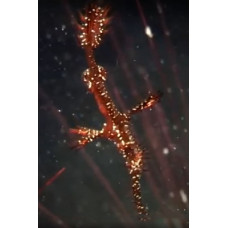Latin name
Solenostomus paradoxus
Other names
Harlequin ghost pipefish
Identification
Vertebrae: 32-33. Post pelagic fishes are almost completely transparent and thinner compared to those formed in the benthic phase. The total number of plates on the body is 31-35.
Features of fish fins
Dorsal spines (total): 5; Dorsal soft rays (total): 17-21; Anal spines: 0; Anal soft rays: 17-21. Caudal fin truncate, rounded or lanceolate.
Fish colouring
Colors range from red to yellow to black, sometimes almost transparent.
Distribution
Found in the western Pacific and Indian Oceans along coral reefs: from eastern Africa (Red Sea) to Fiji, north to southern Japan, south to southeastern Australia and New Caledonia. Recently sighted off Tonga.
Habitat
A marine, tropical, reef associated species. Depth range from 4 to 35 meters.
Size
Reach a maximum length of 12 cm.
Behavior
Adults are usually found along the edges of reefs in areas exposed to currents. Rare species are found singly or in pairs among branches of gorgonians, floating algae or crinoids.
Food and feeding habits
They feed mainly on clams, but also prey on small bottom dwelling shrimp.
Reproduction
Females lay eggs in the pelvic fins, which are modified to form a brood pouch.
Fishing
This species is not interesting for fishermen.
Relationship with a person
Ornate Ghost Pipefish are commonly used in the aquarium hobby.
| Classification | |
| Phylum | Chordata |
| Class | Actinopterygii |
| Squad | Syngnathiformes |
| Family | Solenostomidae |
| Genus | Syngnathiformes |
| Species | S. paradoxus |
| Features | |
| Conservation status | Least Concern |
| Habitat | Pelagic |
| Life span, years | No information |
| Maximum body weight, kg | No information |
| Maximum length, cm | 12 |
| Sailing speed, m/s | No information |
| Threat to people | Not edible |
| Way of eating | Predator |
Ornate ghost pipefish
Tags: ornate ghost pipefish



